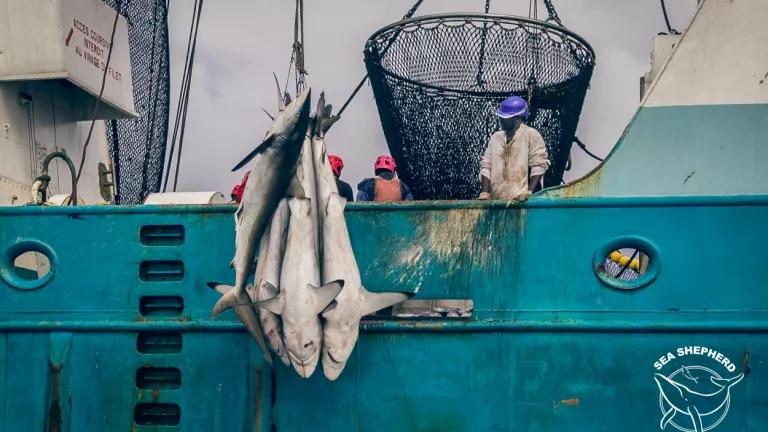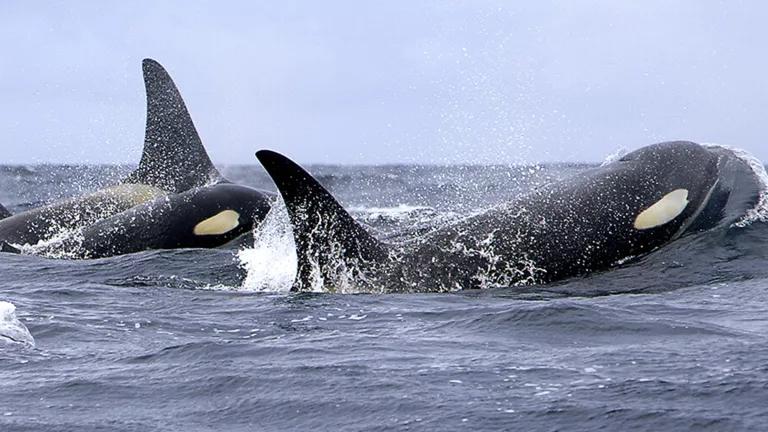NRDC Urges U.S. to Push Nations to End Illegal Shark Fishing

Sharks are some of the most ancient and diverse species on the planet and crucial to ocean health. Today, many sharks and shark-like fish are in steep decline, highly depleted, or both—and the United States has a unique opportunity to help drive conservation for these important marine predators.
The main cause for shark declines is overfishing: sharks, skates, rays, and chimaeras are caught in artisanal and commercial fisheries alike, in coastal waters and on the high seas, for their meat, fins, teeth, oil, and gill plates. Because sharks are slow to mature, late to reach reproductive age, and typically bear few young, they are ill-equipped to withstand industrial and unsustainable fishing pressures. According to the IUCN, roughly a quarter of sharks and shark-like fish are at risk of extinction.
In an effort to address rampant overfishing of sharks, a number of nations and international bodies have adopted measures to push for sustainable fishing of sharks and shark-like fish, and to protect specific species that are at risk of extinction. For example, many nations have banned finning, or established protected areas where shark fishing is prohibited. Most of the regional fisheries management organizations (RFMOs), which are comprised of nations dedicated to sustainably managing fishery resources in international waters, have adopted conservation and management measures within their areas of jurisdiction, including finning bans; retention bans for at-risk shark species, such as oceanic whitetip sharks, hammerhead sharks, silky sharks, and manta and mobula rays; and requirements to report shark catches in order to develop better science to manage shark populations sustainably. Compliance with these measures, however, is notoriously poor and extremely difficult to enforce. Some nations lack the capacity to manage shark fishing effectively, some lack domestic laws to deter fishers from targeting sharks, and some struggle with rogue vessels that intentionally violate laws on the virtually unmonitored high seas.
The High Seas Driftnet Fishing Moratorium Protection Act (HSDFMPA) gives the U.S. leverage to push foreign nations to halt illegal shark fishing around much of the globe. Under the HSDFMPA, the Secretary of Commerce must identify nations in a biennial report to Congress that have, within the previous three years, fished for sharks illegally or targeted sharks on the high seas and lack a regulatory program comparable to that of the U.S. The U.S. must then consult with any identified nations in order to address the fishing violations. If a nation fails to correct the violations, the U.S. may ban targeted seafood imports from that nation.
But despite the strength of this law and its ability to drive compliance with international agreements—and despite the fact that finning and targeting of sharks is known to occur on the high seas—the U.S. has rarely identified nations under the HSDFMPA for any shark violations, and never for fishing for sharks on the high seas.
NRDC believes the U.S. government should exercise its authority under HSDFMPA and leverage the Act to halt illegal fishing and shark targeting in the world’s oceans. To this end, we submitted a letter to the National Marine Fisheries Service (NMFS) in December 2018, providing information to support identification of over 50 nations for shark-related violations. These violations range from failure to comply with data reporting requirements to evidence of shark targeting, finning, and illegal fishing of dolphins and whales in the Pacific, Atlantic, and Indian Oceans.
NMFS and Congress need to leverage the full strength of the HSDFMPA now to pressure these nations to end illegal and targeted shark fishing in the world’s oceans. Rigorous implementation of the Act can help save shark populations, by penalizing nations for unchecked shark fishing on the high seas, and by driving compliance and transparency within the RFMOs, which have a responsibility to ensure the long-term sustainability of sharks within their jurisdiction. By holding foreign nations to their commitments, the U.S. can set the bar for shark conservation—and the accountability of fishing fleets—globally.



